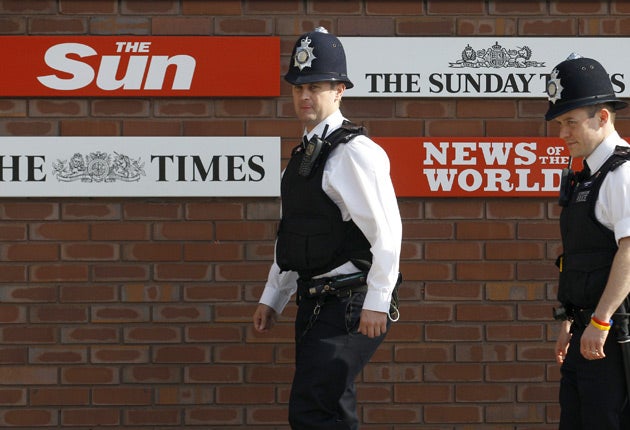Phone hacking: End of the CPS’s action against corrupt tabloid practices leaves unanswered questions
A wide-ranging judicial examination might shine a light into some interesting corners

Your support helps us to tell the story
From reproductive rights to climate change to Big Tech, The Independent is on the ground when the story is developing. Whether it's investigating the financials of Elon Musk's pro-Trump PAC or producing our latest documentary, 'The A Word', which shines a light on the American women fighting for reproductive rights, we know how important it is to parse out the facts from the messaging.
At such a critical moment in US history, we need reporters on the ground. Your donation allows us to keep sending journalists to speak to both sides of the story.
The Independent is trusted by Americans across the entire political spectrum. And unlike many other quality news outlets, we choose not to lock Americans out of our reporting and analysis with paywalls. We believe quality journalism should be available to everyone, paid for by those who can afford it.
Your support makes all the difference.The announcement by the Crown Prosecution Service that it will take no further action against journalists and companies accused of phone hacking appears to draw a line under a scandal which led to the closure of a national newspaper, a judge-led inquiry, multiple trials and all sorts of uncomfortable discoveries about the culture and practices of the tabloids. But while the CPS may have moved on, many will remain hacked off.
After all, it is quite clear that the hacking of voicemails was rife at the News of the World. Nine of the newspaper’s journalists were convicted as a consequence, including department heads and even – in Andy Coulson – the editor himself. When Coulson, who left the News of the World for a job as David Cameron’s communications director, was imprisoned for conspiracy to intercept voicemails in the summer of 2014, it appeared that the chances of a corporate charge against Rupert Murdoch’s News UK had grown. Now that possibility has vanished.
Likewise, despite successful civil suits over phone hacking against Mirror Group Newspapers, publisher of the Mirror titles and Sunday People, its journalists who have been questioned or arrested will not face further action. Nor will the company face prosecution.
The CPS, for sure, has found itself in a difficult position. The Metropolitan Police has already spent more than £40m on investigations relating to journalism. It may be reasonable to conclude that policing priorities have changed since the hacking scandal was at its zenith; it is certainly hard to believe that most members of the public still regard it as urgent in a way they once did.
Moreover, the outcome of Operation Elveden, the discrete investigation of alleged and actual payments by journalists to public officials for information, was largely a disaster for the Met and the CPS. While several individuals were convicted for supplying information for money, all bar one of the journalists charged were ultimately acquitted. Indeed, the charges laid as a result of Elveden were always questionable – not least because they resulted from the release of information to police by the journalists’ employer, News UK. But whether or not the results of these trials is welcome, there is no doubt they reduced the appetite of the CPS to pursue further cases against journalists even in relation to unconnected matters.
So what next? Now that the criminal processes are concluded, there is nothing in principle to prevent the planned second element of the Leveson inquiry, the terms of reference of which include: to inquire into “the extent of unlawful or improper conduct within News International” and other newspaper organisations; to examine the role of the police in its investigation of such conduct; and to inquire into possible corrupt links between newspapers and police.
There are good reasons to think there is indeed unfinished business here. We already know links between the police and some media outlets were less than healthy and have not been fully exposed. A wide-ranging judicial examination might shine a light into some interesting corners.
Yet as judicial sequels go, “Leveson 2” is about as likely as “Chilcot Returns”. A Tory government unfettered from coalition has no desire to reopen divides with a generally compliant media; the public outcry over the discovery that the News of the World had hacked Milly Dowler’s phone is long muted.
Whatever happens, it is vital at this juncture to remember the intense damage that tabloid hacking – and other disreputable practices – caused in those grim years when they were most prevalent. Many lives were ruined without a care, simply for the sake of tawdry stories. The decision by the CPS to close its files must not signal a return to the disgraceful behaviour of the past.
Join our commenting forum
Join thought-provoking conversations, follow other Independent readers and see their replies
Comments